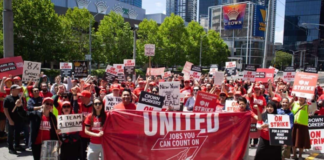Britain’s vote to leave the EU has opened up a profound political crisis. The referendum caused deep splits in the Tory party and Tory Prime Minister David Cameron resigned hours after the vote.
This should have opened up an opportunity for the Labour Party to push back Tory racism and austerity. But just when the Tories were weak and divided, the right wing of the parliamentary Labour Party instead chose to turn on left-wing leader Jeremy Corbyn.
Three quarters of Corbyn’s shadow cabinet resigned to try and force him out. Corbyn lost a no confidence motion amongst Labour MPs by 172 to 40. However he has defied calls to resign, saying he will not betray those who elected him.
Corbyn was elected leader of the party nine months ago on an anti-racist and anti-austerity platform. Thousands flooded into the Labor Party to back him and he was elected leader by 59 per cent of Labor members.
In one of his first speeches after his election he addressed a 50,000 strong rally for refugee rights. He also made a solidarity visit to the “Jungle” refugee camp in Calais.
The right-wing MPs cited Corbyn’s failure to convince Labour voters to remain in the EU. But Corbyn claims that under his leadership, “Labour has repeatedly forced the Government to drop damaging policies, won every by-election with an increased share of the vote, and beaten the Tories in May’s local elections.”
In reality they never wanted the left-wing leader and are contemptuous of the members who voted for him. Last year, the right-wing Labour MPs went along with the £2 billion of cuts in the Tory Welfare Bill, whereas Corbyn voted against. They mostly voted for the Iraq war, Corbyn voted against. Corbyn can use the recent Chilcot report on Britain’s involvement in the Iraq War to go on the offensive against the war-mongers.
The possibility of an early election, opened up by the Tory crisis, helped trigger the move on Corbyn’s leadership. The MPs opposing Corbyn are just as terrified that he might win an election as they are of losing. They agree with Tony Blair who said, “I wouldn’t want to win on an old fashioned leftist platform. Even if I thought that was the route to victory I wouldn’t take it.”
No compromise
The Corbyn campaign needs to resist making further compromises with the right. Corbyn had historically opposed the European Union as anti-democratic and neo-liberal, but agreed to support it in the referendum. Had he channeled anti-austerity sentiment behind a left exit campaign, it would have undercut the right’s racism, and boosted his position.
There are also worrying signs that Corbyn might accept a peace offer. While refusing to resign, he offered to “reach out” to his opponents in a Sunday Mirror article.
Union leader Len McCluskey’s support could be critical. But both McCluskey and Corbyn’s key ally John McDonnell have recently questioned the free movement of people within the EU, an appalling concession to anti-migrant sentiment. Corbyn keeping his leadership, but watering down his policies would be a betrayal of the kind of politics which has inspired people to back him.
The right won’t step back from their assault. Corbyn needs to take them on, even if that leads to a split in the party.
Corbyn’s election mirrors the rise of new left-wing parties Syriza in Greece and Podemos in Spain, but in the UK this took place inside the existing Labour party.
Another 100,000 people have joined the Labour Party to back him since the challenge began. Membership has now grown from 250,000 at the time of the last leadership election to 500,000.
His popularity should be a lesson for Bill Shorten on refugees, and The Greens about the possibility of tapping into the opposition to austerity and the political system through class politics.
Union leaders are backing Corbyn for now. On-going mobilisation and union support motions can add to the pressure on them to hold the line. But it would be a mistake if Corbyn’s supporters limit the struggle to battles inside the Labour Party.
Importantly thousands of people turned up to back Corbyn at a rally organised by the left Labour campaign group Momentum outside parliament at a few days’ notice.
The left’s greatest strength is on the streets and in the workplaces. With the Tories in crisis, and a likely early election, the focus needs to be mobilisation to kick the Tories out on the basis of anti-austerity and anti-racist politics.
This is the kind of struggle that can defend Corbyn, draw in much wider numbers and turn the tables on the Labour right and the Tories.
By Chris Breen





